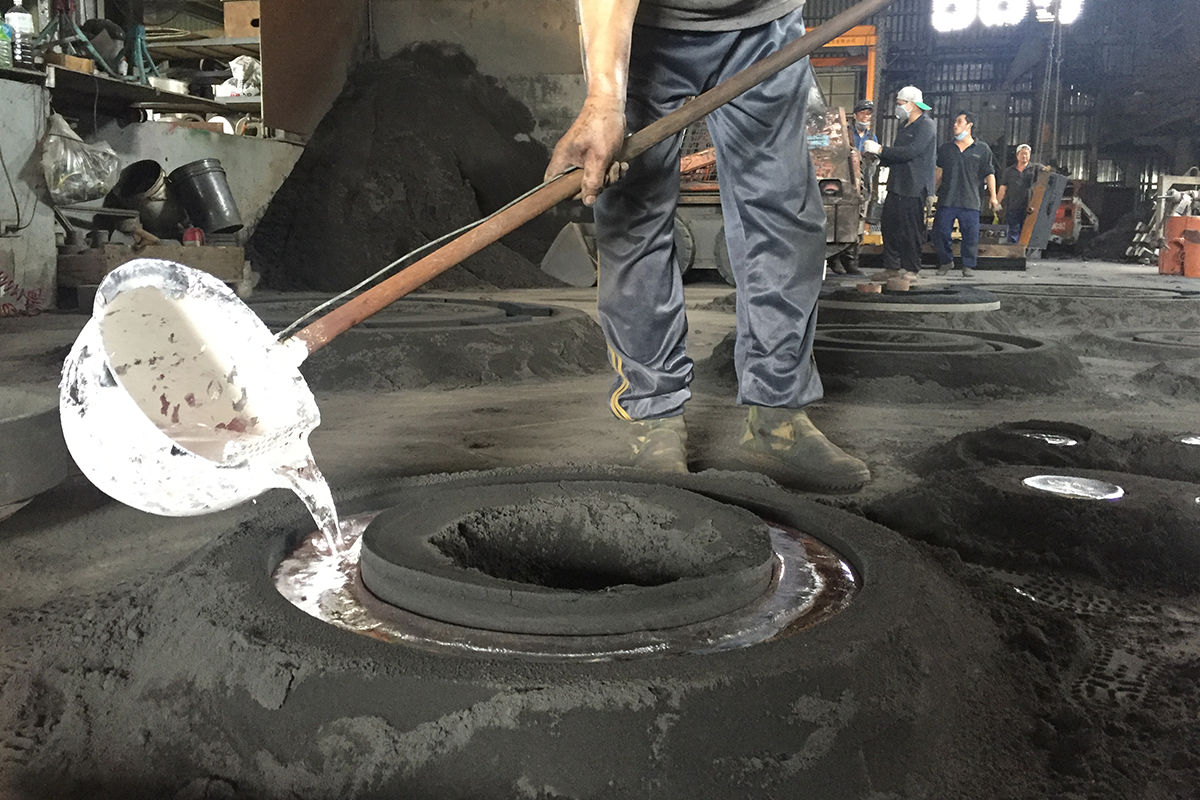How Aluminum Foundry Wisconsin still be relevant in casting
Wiki Article
Comprehending the Advantages and Innovations in the Aluminum Foundry Industry
The Aluminum Foundry industry plays a crucial function in contemporary production. Its lightweight residential or commercial properties significantly improve fuel performance, specifically in auto and aerospace industries. Furthermore, Aluminum's resistance to corrosion guarantees durability in different applications. As the industry develops, technologies such as sophisticated recycling and additive production are reshaping production techniques. Discovering these developments reveals not only the advantages however additionally the obstacles ahead for Aluminum factories in a swiftly changing market.The Lightweight Benefit of Aluminum
Aluminum's light-weight nature provides considerable advantages across numerous markets, especially in manufacturing and transportation. Its reduced density enables for the production of parts that are easier to take care of and install, causing minimized labor prices and boosted performance. In the auto field, lighter cars contribute to improved fuel economic climate and reduced emissions, lining up with international sustainability goals. In aerospace, the usage of Aluminum decreases the total weight of airplane, which is essential for boosting performance and minimizing functional costs.In addition, Aluminum's lightweight residential properties help with cutting-edge designs that were formerly impractical with larger products. This versatility enables makers to develop complex forms and frameworks while preserving architectural honesty. Generally, the lightweight benefit of Aluminum not only boosts item efficiency however additionally drives advancements in modern technology and design, making it a recommended product in various applications.
Corrosion Resistance and Sturdiness
The Aluminum Foundry market is renowned for creating products with remarkable corrosion resistance, making them perfect for various applications. This residential property, combined with enhanced structural integrity, adds to the lasting efficiency advantages that Aluminum parts provide. Because of this, industries progressively rely upon Aluminum to satisfy requiring ecological conditions without jeopardizing top quality.
Superior Rust Resistance
While various metals face substantial difficulties from ecological variables, Aluminum stands apart for its exceptional deterioration resistance, making it a preferred choice in many applications. This building is mainly because of a natural oxide layer that develops on the Aluminum surface, providing a barrier against wetness and destructive agents. Unlike other metals that may corrosion or break down gradually, Aluminum maintains its integrity also in extreme atmospheres, such as seaside areas or industrial settings. In addition, its lightweight nature integrated with rust resistance makes it excellent for applications in aerospace, automobile, and marine industries. Overall, Aluminum's phenomenal sturdiness not just improves item longevity but additionally minimizes maintenance prices, offering a compelling benefit for makers and consumers alike.Enhanced Architectural Stability
Engineers and developers progressively identify the value of improved structural honesty in modern-day applications, where both rust resistance and sturdiness are important. Aluminum alloys, understood for their lightweight homes, also display outstanding resistance to rust, making them suitable for rough atmospheres. The cutting-edge methods used in the Aluminum Foundry market add considerably to generating elements with boosted toughness. Advanced casting processes and alloy compositions are customized to fulfill certain performance requirements, guaranteeing that structures can withstand severe conditions without jeopardizing honesty. Additionally, surface treatments and finishings boost the lifespan of Aluminum products, even more alleviating damage in time. This emphasis on boosted structural stability not just expands the use of products however likewise lowers maintenance expenses, strengthening Aluminum's setting as a material of choice in different markets.Durable Performance Benefits
Lasting efficiency in Aluminum parts is mostly connected to their exceptional rust resistance and longevity. Unlike several steels, Aluminum normally creates a safety oxide layer, which protects against rust and damage in numerous atmospheres, consisting of aquatic and commercial setups. This fundamental building substantially prolongs the life expectancy of Aluminum products, minimizing upkeep and substitute costs. In addition, the lightweight nature of Aluminum enhances its applicability throughout industries without jeopardizing strength. The product's resistance to damage also adds to its integrity popular applications, making it a suitable choice for auto, aerospace, and building and construction markets. As industries significantly prioritize sustainability and longevity, Aluminum's performance advantages straighten with modern engineering needs, strengthening its role in cutting-edge production processes.Environmental Impact and Sustainability
 As the Aluminum Foundry industry advances, it significantly focuses on ecological impact and sustainability, identifying the demand for liable practices despite climate change. Efforts to lessen waste and energy usage go to the center, with several shops adopting recycling efforts to redeem Aluminum scrap. This not only lowers basic material usage but additionally significantly reduces power expense, as recycled Aluminum calls for just a portion of the power contrasted to key manufacturing.
As the Aluminum Foundry industry advances, it significantly focuses on ecological impact and sustainability, identifying the demand for liable practices despite climate change. Efforts to lessen waste and energy usage go to the center, with several shops adopting recycling efforts to redeem Aluminum scrap. This not only lowers basic material usage but additionally significantly reduces power expense, as recycled Aluminum calls for just a portion of the power contrasted to key manufacturing.Furthermore, innovations in exhausts regulate modern technologies are being implemented to reduce air toxins, aligning procedures with more stringent ecological regulations. Foundries are additionally exploring different power resources, such as solar and wind, to power their facilities sustainably. By promoting cooperation with stakeholders, the sector intends to develop innovative services that enhance eco-friendly stewardship. Jointly, these campaigns highlight a commitment to decreasing the Aluminum Foundry's carbon footprint while advertising a round economic situation within the production market.
Advanced Manufacturing Techniques
 Changing manufacturing processes, the Aluminum Foundry sector is progressively integrating innovative production techniques to boost efficiency and precision. Techniques such as computer system numerical control (CNC) machining and additive production have emerged as vital components in enhancing manufacturing workflows. CNC machining allows for high-precision element manufacture, significantly lowering product waste and production time. At the same time, additive production opens new methods for complicated geometries and light-weight styles that were previously difficult to accomplish.
Changing manufacturing processes, the Aluminum Foundry sector is progressively integrating innovative production techniques to boost efficiency and precision. Techniques such as computer system numerical control (CNC) machining and additive production have emerged as vital components in enhancing manufacturing workflows. CNC machining allows for high-precision element manufacture, significantly lowering product waste and production time. At the same time, additive production opens new methods for complicated geometries and light-weight styles that were previously difficult to accomplish.Furthermore, the release of automation and robotics in Aluminum shops enhances procedures, reduces human mistake, and boosts employee safety. These modern technologies facilitate a more responsive manufacturing atmosphere, making it possible for manufacturers to adapt swiftly to market demands. The combination of innovative simulation software program further enhances the style and testing phases, leading to exceptional item top quality. Jointly, these methods not just enhance operational effectiveness however likewise foster development, positioning the Aluminum Foundry market at the forefront of contemporary manufacturing.
Developments in Recycling Procedures
The Aluminum Foundry industry is not just progressing in manufacturing strategies however is likewise making significant strides in recycling procedures. Advancements are emerging to improve the efficiency of recycling methods, reducing energy usage and improving sustainability. Advanced arranging innovations, such as computerized optical sorting, allow the recognition and separation of Aluminum from various other materials with high precision. This results in a higher top quality of recycled Aluminum, which is vital for maintaining the honesty of the last products.
In addition, closed-loop recycling systems are being carried out, enabling manufacturers to recycle Aluminum scrap within their own manufacturing processes. This minimizes waste and advertises a round economic climate. In addition, research study into new recycling strategies, such as hydrometallurgical processes, uses the capacity for recouping Aluminum from complex waste streams. These innovations not only add to decreasing the carbon impact of the Aluminum Foundry industry however additionally bolster its economic stability in a significantly eco conscious market.
Applications Throughout Various Industries
Numerous markets are increasingly identifying the versatility and benefits of Aluminum Foundry items, resulting in extensive applications throughout fields such as auto, consumer, aerospace, and construction products. In the vehicle sector, Aluminum spreadings add to light-weight lorry layouts, enhancing fuel performance and performance. Aerospace producers utilize Aluminum components for their strength-to-weight ratio, essential for aircraft frameworks and parts.In building and construction, Aluminum is preferred for its resilience and resistance to corrosion, making it excellent for home window frameworks, roof, and architectural supports. Consumer items likewise gain from Aluminum Foundry products, as seen in cookware, electronics, and packaging, where light-weight and recyclable materials are important.
The adaptability of Aluminum Foundry methods enables exact requirements and detailed styles, dealing with the varied demands of these markets. As an outcome, Aluminum Foundry products are becoming integral to modern-day production processes throughout different markets.
Future Patterns in Aluminum Foundries
As industries remain to advance, Aluminum shops are positioned to embrace numerous crucial trends that promise to boost effectiveness and sustainability. One popular fad is the boosting adoption of electronic innovations, including automation and expert system, which simplify operations and boost quality control. On top of that, the push towards lasting practices is leading factories to invest in reusing technologies, greatly minimizing waste and energy consumption. An additional emerging fad is making use of advanced alloys and materials, accommodating the expanding need for sturdy and light-weight parts throughout different sectors (Aluminum Foundry). Additionally, the assimilation of additive production strategies is anticipated to change part style, providing personalization and reducing lead times
An additional emerging fad is making use of advanced alloys and materials, accommodating the expanding need for sturdy and light-weight parts throughout different sectors (Aluminum Foundry). Additionally, the assimilation of additive production strategies is anticipated to change part style, providing personalization and reducing lead timesCollaboration with research study establishments is additionally anticipated to drive technology, as foundries seek to establish new processes and materials. Aluminum Foundry. Collectively, these trends suggest a transformative future for the Aluminum Foundry market, aligning with broader objectives of sustainability and performance
Regularly Asked Concerns
What Are the Common Prices Related To Aluminum Foundry Manufacturing?
The normal expenses associated with Aluminum Foundry manufacturing include basic materials, labor, power, tools maintenance, and overhead expenses. These aspects jointly influence the total monetary investment required for effective Aluminum spreading operations.How Does Aluminum Contrast to Various Other Steels in Stamina?
Aluminum, while lighter than numerous steels, displays impressive strength-to-weight proportions. Compared to steel, Aluminum is much less solid yet supplies outstanding deterioration resistance, making it a desirable selection in applications where weight and longevity are essential.What Precaution Are in Area in Aluminum Foundries?
Precaution in Aluminum factories generally consist of compulsory individual protective tools, air flow systems to control fumes, normal devices maintenance, training programs for staff members, and Aluminum Foundry Wisconsin adherence to stringent safety and security guidelines to lessen dangers related to liquified steel handling.How Is High Quality Control Managed in Aluminum Casting Processes?
Quality control in Aluminum spreading procedures involves rigorous inspections at different phases, including raw material examination, process surveillance, and final product testing. Methods such as analytical process control and non-destructive testing warranty adherence to sector criteria.What Certifications Are Very Important for Aluminum Foundry Distributors?
The significance of accreditations for Aluminum Foundry providers consists of ISO 9001 for high quality monitoring, ISO 14001 for ecological monitoring, and industry-specific criteria like ASTM and SAE, ensuring compliance, safety, and reliability in manufacturing processes.The Aluminum Foundry industry plays an essential function in modern production. The Aluminum Foundry industry is renowned for producing materials with exceptional deterioration resistance, making them perfect for different applications. Changing manufacturing processes, the Aluminum Foundry market is progressively integrating advanced manufacturing strategies to enhance efficiency and precision. The Aluminum Foundry industry is not only advancing in producing strategies yet is also making significant strides in recycling processes. As industries continue to develop, Aluminum foundries are poised to embrace a number of crucial patterns that guarantee to improve effectiveness and sustainability.
Report this wiki page